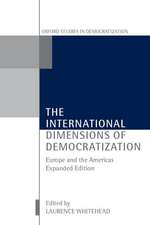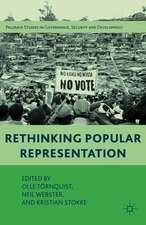The Changing Basis of Political Conflict in Advanced Western Democracies: The Politics of Identity in the United States, the Netherlands, and Belgium: Perspectives in Comparative Politics
Autor A. Arwine, L. Mayeren Limba Engleză Hardback – 10 iun 2013
Din seria Perspectives in Comparative Politics
-
 Preț: 387.96 lei
Preț: 387.96 lei -
 Preț: 383.93 lei
Preț: 383.93 lei - 15%
 Preț: 639.25 lei
Preț: 639.25 lei -
 Preț: 389.70 lei
Preț: 389.70 lei -
 Preț: 381.98 lei
Preț: 381.98 lei -
 Preț: 385.84 lei
Preț: 385.84 lei -
 Preț: 385.47 lei
Preț: 385.47 lei -
 Preț: 386.81 lei
Preț: 386.81 lei -

Preț: 383.93 lei
Nou
Puncte Express: 576
Preț estimativ în valută:
73.48€ • 76.42$ • 61.49£
73.48€ • 76.42$ • 61.49£
Carte tipărită la comandă
Livrare economică 15-29 martie
Preluare comenzi: 021 569.72.76
Specificații
ISBN-13: 9781137306647
ISBN-10: 1137306645
Pagini: 119
Ilustrații: XIV, 119 p.
Dimensiuni: 140 x 216 x 11 mm
Greutate: 0.32 kg
Ediția:2013
Editura: Palgrave Macmillan US
Colecția Palgrave Pivot
Seria Perspectives in Comparative Politics
Locul publicării:New York, United States
ISBN-10: 1137306645
Pagini: 119
Ilustrații: XIV, 119 p.
Dimensiuni: 140 x 216 x 11 mm
Greutate: 0.32 kg
Ediția:2013
Editura: Palgrave Macmillan US
Colecția Palgrave Pivot
Seria Perspectives in Comparative Politics
Locul publicării:New York, United States
Cuprins
Forward Preface List of Tables and Figures Chapter One: Introduction: The Forces Producing the New Politics of Identity The Impact of Modernization on the Cleavage Structure in the West Populism in the Modern World The Challenge to Classic Conservatism in the West Cultural Change in Western Nations Classic Conservatism and the Centrist Left Tolerance and the Politics of Identity Political Change and the Role of Ideas Conclusion References Chapter Two: Political Change in a Stable Two Party State: The United States The Electoral System Party System Accommodation to Cultural Change in an Aggregated Two Party System American Populism as a Response to Socio-Economic Change in the United States The Social Context of Politics in the United States and Social Change The U.S. Party System and a Changing Cleavage Structure The Return of Populism in Contemporary America The Emerging Politics of Identity The Mobilization of the American Electorate Ideas and Ideology in the American Political System Conclusions: A Stable Party System and a Changing Electorate References Chapter Three: The Netherlands: Politics in a Fragmented Culture A Parliamentary System in a Fragmented Society The Rise and Decline of Pillarization and the Consociational Accommodation A Tolerant Society and the Muslim Challenge The Accommodation of the Party System to a Changing Society The Emerging Politics of Identity Conclusions: Party System Adaptation to a Changing Culture References Chapter Four: Belgium: The Politics of Extreme Segmentation The Consociational Model for Segmented Societies Constitutional Change: Accommodating a Segmented Culture The Belgian Political Party System: Accommodating Cultural Change The Regime Format of a Culturally Segmented Political System Conclusion: The Issue of Identity in a Culturally Segmented Society References Chapter Five: Conclusions: Patterns of Change in Advanced Western Democracies The Declining Salience of Socio-Economic Class The State in the Crisis of Economic Stagnation Party System Change in Europe Trends and Changes in the Constitutionally Designated Structures of Western Democracies The Americanization of the Politics of Western Democracies The Twilight of the Nation-State? The Inexorability of Political Change Index
Recenzii
"In this new book, Arwine and Mayer provide an insightful and well-informed analysis of how the basis of political conflict has been changing in the U.S. and other advanced industrial societies. Fifty or sixty years ago, people's political loyalties largely reflected their social class and religious denomination. Today how people vote is more strongly shaped by cultural and ethnic differences, with sharp disagreements over such issues as same-sex marriage, abortion rights and immigration. This book helps us understand why, although income inequality has risen sharply in recent decades, efforts to offset this trend have been surprisingly weak." - Ronald Inglehart, Lowenstein Professor of Political Science and Research Professor at the Institute for Social Research, University of Michigan, USA
Notă biografică
Author Alan T. Arwine: Alan T. Arwine is a Lecturer in Political Science at the University of Kansas.Author Lawrence C. Mayer: Lawrence C. Mayer is a Professor of Political Science at Texas Tech University.


















